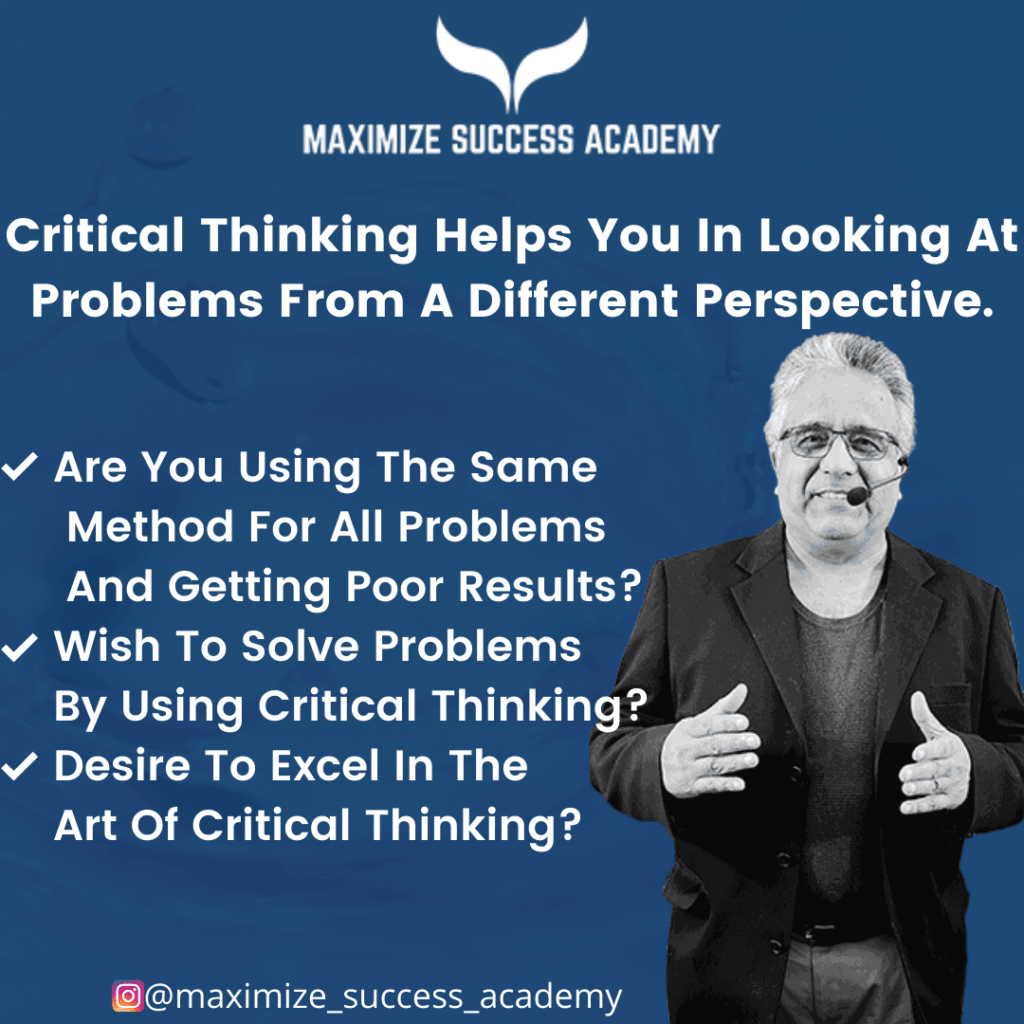What Is Critical Thinking?
Critical thinking is the skill of analyzing an issue, situation, fact, or idea to make a logical and informed decision to the best of your ability. A Critical thinker looks for logic in everything and decides after considering every aspect of the situation. Critical thinking is about being an active learner rather than a passive recipient of information.
Critical thinkers question situations and ideas rather than accepting them. They identify, analyze, and solve problems logically rather than by intuition or indistinct.
Basic steps for critical thinking:
- Identification: Identify the situation or issue deeply. Then figure out who is going to influence it or is getting affected by this. Once you have a precise scenario of the case, you can begin diving deeper into the issue.
- Research: Research the topic properly before taking any step or decision.
- Identifying biases: Before taking any decision or action, make sure you are not making a biased decision. After considering all these points, step forward to make a decision.
Importance Of Removing Biases:
When one decides based on some selfish motive, rather than evaluating the pros and cons of everything to make an informed decision, they are biased. Or we can say being biased means taking a partial decision. For example, John is a judge of a talent show. His sister’s friend, Kristy, is participating in the talent show. John votes for Kristy as the winner because he knows her and not based on the guidelines and criteria. Therefore, he made a biased decision/vote.
Biases affect the judgments and decisions you make. It’s important to ensure all facts and opinions involved are considered to avoid any rifts or feelings of inferiority amongst the involved parties.
Types of biases
Following are some different kinds of biases that we experience in our day to day lives:
- Self-serving bias: Have you ever failed a paper and blamed your teacher for not teaching in the right way, or scored good marks and appreciated yourself for studying. This is determined as a Self-Serving bias, as you praise or appreciate yourself for doing good and blame others for your bad result.
- Curse of Knowledge or Curse of expertise: Curse of Knowledge bias occurs when you think that the person you are sharing your idea with will understand you, as he/she has the same background as yours. This can result in a misunderstanding between two individuals.
- Optimism/Pessimism Bias: Optimism bias considers that one’s chances of experiencing positive events are higher than negative ones. This can lead to an unfair decision regarding any concept.
- In-Group Bias: In-group bias refers to favouring members of your team or similar team and gender above others. For example, supporting your favourite team in the cricket match is In-group.
- The Backfire Effect: As the name suggests, the backfire effect bias strengthens people’s beliefs even after encountering challenging shreds of evidence against their ideas. For example, when you bring up some negative controversy about a celebrity in the presence of a dedicated fan, that fan may further solidify his/her support for that celebrity after hearing the information.
Ways to overcome different biases:
You can overcome these biases by taking care of some essential points:
- Accept the truth that you sometimes act biased while making some decisions or treating people.
- Remain updated on social media to get information about discrimination prejudice going on in society.
- Try to hang out with people who have a better attitude than you to help you think more positively of others.
- Make an effort to be friendlier and less threatened when interacting with new people. We all know the saying, “don’t judge a book by its cover.” We really must make it a point to follow this saying. Maybe you are thinking wrong by just watching their outer look. Perhaps your first impression was that the person was tardy looking, so you automatically don’t want to interact with them any further. However, it’s important to get past your first impression to find the individual’s real personality. Give the person a real chance to prove him/herself.
- Make a list of when your biases impact your behaviour. Then try to avoid that situation by thinking creatively.
By the way, do you have a hard time getting past your first impressions? Are you having a hard time overcoming your biases? Do you lack the skills required to make objective decisions? Well, you too can master the art of critical thinking to overcome any biases you may have by Meeting Us here and get the details of the course.
If you want to know more about our Indo-Canadian trainer and us, Click Here.


I appreciate you sharing this blog article. Keep writing. Josefina Marven Tess